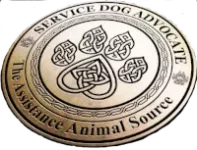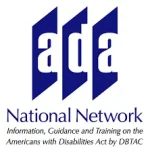I was sort of surprised when a firestorm erupted at one of the service dog pages I help with, and all over the need for a doctor's note. A few lone voices yelling about the ADA guidelines of not having to have any documentation for the service dog against a multitude of followers pointing out that sometimes a doctor's note is required.
Those stating that a letter from the teams' medical professional was not needed were correct to a very small point. The ADA does say that no paperwork can be requested while the team is in a public setting. The ADA is mainly concerned about making sure those of us that are disabled are not discriminated against while we are in public. As a point, the ADA FAQ answers easily.

However, there are other sections within the service dog guideline that all teams in the United States should be aware of.
Fair Housing Act (FHA)
Those renting may fall under the FHA mandates. This will depend on the rental management if they fall under the FHA. My rule of thumb is if the owner rents out more than 5 units (or 4 and doesn't not live in one of those), or the rental is handled through a management company it will be covered by the FHA. As with government agencies, there could be other things involved, so do some research, or just ask the prospective landlord if they are covered by the FDA.
The FHA guidelines group both emotional service animals and service dogs into a single category termed "Assistance Animals".
"An assistance animal is an animal that works, provides assistance, or performs tasks for the benefit of a person with a disability, or that provides emotional support that alleviates one or more identified effects of a person's disability. An assistance animal is not a pet."
Having an assistance animal, in which the FHA is involved, grants several privileges.
This is all decently easy. The handler/owner simply needs to go to their landlord/manager and request "reasonable accommodations" for their assistance animal. It is always better to do all of this in writing, paper trails are VERY important, just in case you have problems later.
Asking for "reasonable accommodations" should start a process of paperwork. If it does not you can do it yourself, again in writing. The letter should be something like this:
That is the main portion of what needs to be done and the easiest. The second part is what tends to be argued about, the doctor's letter. Yes, even if your assistance animal is a service dog you must have a letter from your medical professional. Sometimes other paperwork can be provided, but that is up to the landlord. They can also ask you for your animal's pet records to make sure they are all caught up on their vaccinations. Rabies the most important.
The FHA put together a Fact Sheet that covers this.
"One reliable form of documentation is a note from a person's health care professional that confirms a person's disability affecting a major life activity and the related need for an assistance animal for therapeutic purposes when the health care professional has personal knowledge of the individual."
Some of the larger property groups have started using third-party companies to validate reasonable accommodations requests with assistance animals as they tend to know more about laws and what is required and what is not.
If you need some help with templates for the doctor's note Psychiatric Service Dog Partners did a great one (Service Dog Letter templates).
I hope this was helpful. Any feedback is welcome either here under the article or within our forums.
Those stating that a letter from the teams' medical professional was not needed were correct to a very small point. The ADA does say that no paperwork can be requested while the team is in a public setting. The ADA is mainly concerned about making sure those of us that are disabled are not discriminated against while we are in public. As a point, the ADA FAQ answers easily.
However, there are other sections within the service dog guideline that all teams in the United States should be aware of.
Fair Housing Act (FHA)
Those renting may fall under the FHA mandates. This will depend on the rental management if they fall under the FHA. My rule of thumb is if the owner rents out more than 5 units (or 4 and doesn't not live in one of those), or the rental is handled through a management company it will be covered by the FHA. As with government agencies, there could be other things involved, so do some research, or just ask the prospective landlord if they are covered by the FDA.
The FHA guidelines group both emotional service animals and service dogs into a single category termed "Assistance Animals".
"An assistance animal is an animal that works, provides assistance, or performs tasks for the benefit of a person with a disability, or that provides emotional support that alleviates one or more identified effects of a person's disability. An assistance animal is not a pet."
Having an assistance animal, in which the FHA is involved, grants several privileges.
- If pets are not allowed, the assistance animal is allowed.
- No pet fee can be required.
- There are no limits to size, breed*, or weight.
- Assistance animals do not count towards any "pet limit".
- The animal owner is responsible for any damage incurred by the animal.
- If the landlord can show any undue financial burdens due to the animal, they can deny it. We mainly see this with landlords with insurance that do not allow specific breeds.
This is all decently easy. The handler/owner simply needs to go to their landlord/manager and request "reasonable accommodations" for their assistance animal. It is always better to do all of this in writing, paper trails are VERY important, just in case you have problems later.
Asking for "reasonable accommodations" should start a process of paperwork. If it does not you can do it yourself, again in writing. The letter should be something like this:
That is the main portion of what needs to be done and the easiest. The second part is what tends to be argued about, the doctor's letter. Yes, even if your assistance animal is a service dog you must have a letter from your medical professional. Sometimes other paperwork can be provided, but that is up to the landlord. They can also ask you for your animal's pet records to make sure they are all caught up on their vaccinations. Rabies the most important.
The FHA put together a Fact Sheet that covers this.
"One reliable form of documentation is a note from a person's health care professional that confirms a person's disability affecting a major life activity and the related need for an assistance animal for therapeutic purposes when the health care professional has personal knowledge of the individual."
Some of the larger property groups have started using third-party companies to validate reasonable accommodations requests with assistance animals as they tend to know more about laws and what is required and what is not.
If you need some help with templates for the doctor's note Psychiatric Service Dog Partners did a great one (Service Dog Letter templates).
I hope this was helpful. Any feedback is welcome either here under the article or within our forums.
















